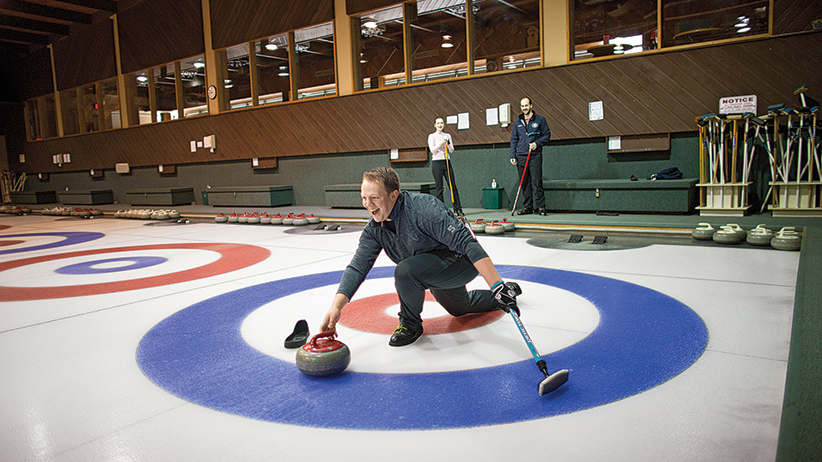Israel looks to launch curling team for Pyeongchang Olympics
No ice? No curlers? A recruitment drive in Canada and in the U.S. is fuelling dreams of Olympic glory
Photograph by Brent Foster
Share

During the 1998 Nagano Olympics, suburban Detroit high schooler Jeff Lutz moved the family’s portable six-inch TV into his bedroom. “It only got four channels,” said Lutz, “and CBC was the only one that was playing the Games.” Thankful to be one of the few Americans with access to the Canadian channel, he watched curling every night for two weeks and fell in love with the game. When he contacted his local club, they told him they were shutting down—forcing Lutz to learn how to curl “across the river” in Windsor, Ont. Flash-forward 16 years and Lutz, who played on a U.S. junior team and at Syracuse University, remains competitive at the Windsor club—and still has Olympic dreams.
So when he read that the Israel Curling Federation (ICF) was recently reinstated into the World Curling Federation (WCF), the Jewish cross-border curler thought this might be his chance. He sent a letter of congratulations to Simon Pack, the Jerusalem-based, U.S.-educated sports-management guru largely responsible for the reinstatement and included a bio. Pack replied: “When are you going to come to the Israeli consulate in Chicago and apply for citizenship?” Pack would like to field men’s and women’s Israeli national curling teams in Pyeongchang, South Korea, at the 2018 Olympic Games. “Yes, it’s a dream,” says Pack, who doesn’t curl competitively himself. “But we’re being realistic. A lot of things would have to happen.”
Imagine the obstacles. Only about 200 people curl in Israel, says Pack, and he admits none of them would be good enough for a national team. Also, there is almost nowhere to curl—to the dismay of an increasing number of cold-weather-country immigrants who miss winter sports. There is no dedicated facility, no curling sheets, and fewer than five ice rinks across the whole country. “And the ice is poor,” laments Pack. There’s also little money. The ICF gets a small amount from Israel’s lotto, and a chunk from the development branch of the WCF, but the government and Olympic committee will only fund a team once there’s been success at an international level.
To that end, Pack and Sharon Cohen—the secretary general of the ICF, who runs a wheelchair-curling program for disabled veterans—made a week-long recruiting trip to Chicago, Boston and Windsor. Pack needs teams in place for the European “C” Championships this October, the first stop on the road to the 2018 Games. He has to register by May. They met with about 15 men and five women whom they are considering, including Lutz, 30, and his younger brother, Brad. Then there’s Rachel Katzman, a 15-year-old curler from Windsor, who’s on a successful high school team. Pack would love for her to join the team, but there’s the problematic mandatory Israeli citizenship requirement: up to three years of military service for men and women between the ages of 18 and 30. “I want to curl for the rest of my life,” says Katzman. “I don’t want to go to the military.” Pack understands, but points out there are some exemptions for athletes. “I’d have to have that in writing,” says Katzman’s mother, Marilee Marcotte.
The biggest surprise of the tour, says Pack, came from the small town of Leamington, Ont., which opened up its curling venue to the delegation—despite the fact that there’s not a Jewish person in the club. They provided homemade food, an open bar and an enthusiastic crowd. There was much more kibitzing than curling, says Lutz. After hearing that many of the curling stones back in Israel are missing handles, one club member tracked down a supplier and is sending new ones. “We didn’t get as warm of a reception at the Jewish clubs we went to,” says Pack.
The ICF has also found support in a Canadian city more synonymous with curling. Winnipeg’s David Greaves is the director of marketing and development for the Jewish Foundation of Manitoba and was a member of Israel’s first bobsled team in 2002. Greaves has offered advice, introduced Pack to members of Winnipeg’s legendary curling community, including Terry Braunstein and Ray Turnbull, and will arrange for the city to host the next tryout-training camp for the Israeli team this spring. “I don’t think this is insurmountable,” says Greaves. “Other countries have done this in curling. They’ve moved to Canada to compete and got the crap kicked out of them. But their game now is world-class.”
For Lutz, it will be a thrill just to make it to the training camp. “Who would not want, as a curler, the chance to go to Winnipeg and be among the greats out there? It gives me chills.” As for sending an Israeli curling team to the Olympics? “Curling is a thinking sport, a strategy sport,” says Pack. “For Jewish people, it’s a good sport.”